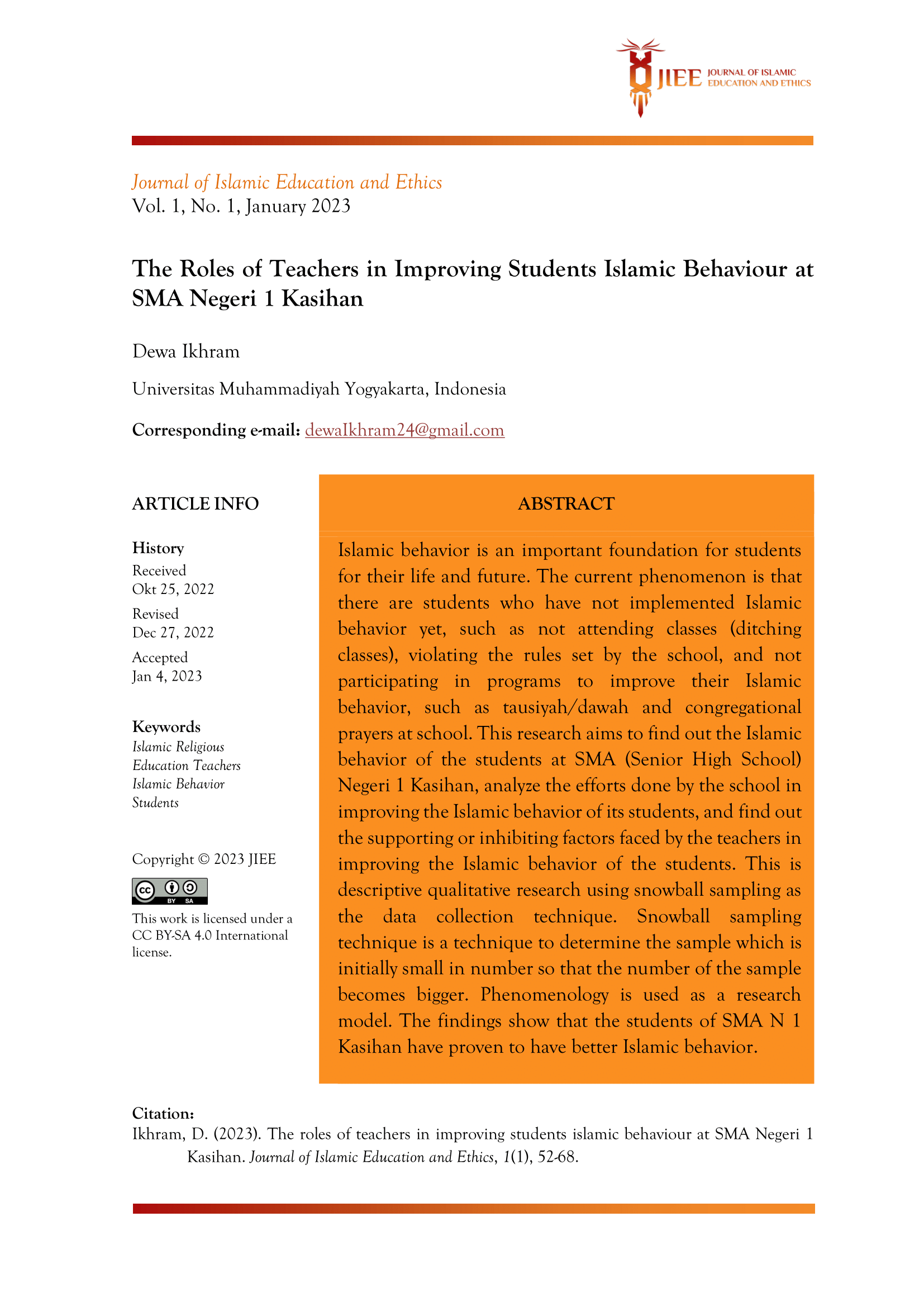The Roles of Teachers in Improving Students Islamic Behaviour at SMA Negeri 1 Kasihan
DOI:
https://doi.org/10.18196/jiee.v1i1.7Keywords:
Role, Islamic Education, Teachers Islamic behavior, StudentsAbstract
Islamic behavior is an important foundation for students for their life and future. The current phenomenon is that there are students who have not implemented Islamic behavior yet, such as not attending classes (ditching classes), violating the rules set by the school, and not participating in programs to improve their Islamic behavior, such as tausiyah/dawah and congregational prayers at school. This research aims to find out the Islamic behavior of the students at SMA (Senior High School) Negeri 1 Kasihan, analyze the efforts done by the school in improving the Islamic behavior of its students, and find out the supporting or inhibiting factors faced by the teachers in improving the Islamic behavior of the students. This is descriptive qualitative research using snowball sampling as the data collection technique. Snowball sampling technique is a technique to determine the sample which is initially small in number so that the number of the sample becomes bigger. Phenomenology is used as a research model. The findings show that the students of SMA N 1 Kasihan have proven to have better Islamic behavior.
Downloads
References
Alawiyah, F. (2013). Peran guru dalam kurikulum 2013. Aspirasi: Jurnal Masalah-Masalah Sosial, 4(1), 65–74. https://doi.org/10.46807/aspirasi.v4i1.480
Alfurqan, A., Tamrin, M., Trinova, Z., & Zuhdiyah, Z. (2019). The problematics of islamic religious education teacher in using of instructional media at SD Negeri 06 Pancung Soal Pesisir Selatan. Al-Ta’Lim Journal, 26(1), 56–64. https://doi.org/10.15548/jt.v26i1.526
Arifin, S. (2016). Islamic religious education and radicalism in Indonesia: Strategy of de-radicalization through strengthening the living values education. Indonesian Journal of Islam and Muslim Societies, 6(1), 93–126. https://doi.org/10.18326/ijims.v6i1.93-126
Dudin, M. N., Pogrebinskaya, E. A., Sukhova, E. I., & Kirsanov, A. N. (2019). Modern religious education as the basis for the development of new confessional relations. European Journal of Science and Theology, 15(5), 133–145. https://repository.rudn.ru/ru/records/article/record/55002/
Hadi, M. (2017). Religiusitas remaja SMA. Tapis : Jurnal Penelitian Ilmiah, 1(2), 04–22. https://doi.org/10.32332/tapis.v1i02.925
Haniyyah, Z. (2021). Peran guru PAI dalam pembentukan karakter islami siswa di SMPN 03 Jombang. Irsyaduna: Jurnal Studi Kemahasiswaaan, 1(1), 75–86. https://jurnal.stituwjombang.ac.id/index.php/irsyaduna/article/view/259
Hidayat, R. (2018). Peran Guru Pendidikan Agama Islam Dan Budi Pekerti Dalam Membentuk Kepribadian Siswa Smk Al-Bana Cilebut Bogor. Prosiding Al Hidayah Pendidikan Agama Islam, 146–157.
Irwanto, Z. (2017). Perilaku agresif dan penanganannya melalui konseling islami. Jurnal Psikologi Pendidikan dan Konseling: Jurnal Kajian Psikologi Pendidikan Dan Bimbingan Konseling, 3(1), 26-34. https://doi.org/10.26858/jpkk.v0i0.2995
Khadijah, K. (2020). Perkembangan jiwa keagamaan pada remaja. Jurnal Al-Taujih: Bingkai Bimbingan dan Konseling Islami, 6(1), 1-9.
Lisnawati, S. (2016). The habituation of behavior as students’ character reinforcement in global era. Jurnal Pendidikan Islam, 2(3), 413. https://doi.org/10.15575/jpi.v2i3.852
Noor, T. (2018). Rumusan Tujuan Pendidikan Nasional Pasal 3 Undang-Undang Sistem Pendidikan Nasional No 20 Tahun 2003. Wahana Karya Ilmiah Pendidikan, 3(1), 123–144. https://journal.unsika.ac.id/index.php/pendidikan/article/view/1347
Ratnawati, H. (2016). Analisis kuantotatif instrumen penelitian (panduan peneliti, mahasiswa dan psikometrian). Parama Publishing.
Saepudin, J. (2018). Implementasi Pembelajaran Pendidikan Agama Islam Di Institut Teknologi Bandung. Al-Qalam, 24(2), 258-270. http://dx.doi.org/10.31969/alq.v24i2.525
Sugiharto, R. (2017). Pembentukan Nilai-Nilai Karakter Islami Siswa Melalui Metode Pembiasaan. Educan : Jurnal Pendidikan Islam, 1(1), 89-109. https://doi.org/10.21111/educan.v1i1.1299
Warsah, I. (2020). Islamic Psychological analysis regarding to raḥmah based education portrait at IAIN Curup. Psikis : Jurnal Psikologi Islami, 6(1), 29–41. https://doi.org/10.19109/psikis.v6i1.3941
Zein, M. (2016). Peran Guru dalam Pengembangan Pembelajaran. Jurnal Inspiratif Pendidikan, 5(2), 274–285. http://103.55.216.56/index.php/Inspiratif-

Downloads
Published
How to Cite
Issue
Section
License
Copyright (c) 2023 Journal of Islamic Education and Ethics

This work is licensed under a Creative Commons Attribution-ShareAlike 4.0 International License.




